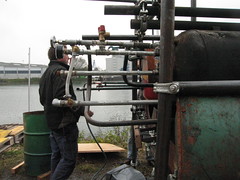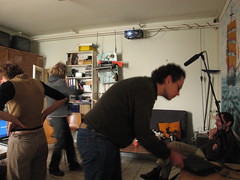Featured pages
Luminous Green 2007
Possible Futures...
Active Discussions...
This is an old revision of the document!
Luminous Green Time's Up Style
Day 3 of Luminous Green in Linz
The construction of the various components of the Time's Up urban steam baths are continuing in full speed. More and more of the components are beginning to function (i.e. squirt water of various degrees of cleanliness and temperature), and they are slowly beginning to be connected. This work is better described in pictures then words, so the flicker pages are probably the best place to witness the progress (here, here and here). The plan is to test the hot tub after the final dinner, or sometime later tonight.
Christian Siefkes
The morning of the last day was dedicated to Christian Siefkes, a computer scientist from Berlin, who works and researches peer economy & production. He is looking at possible post-capitalist models of society and attempting to answer the question how such a society could be organised.
He mentioned several already existing examples. In the free software community people involved do things because they enjoy doing them, or because they have a need for something (the itch & scratch method). Free content propagation, helped by Creative Commons (http://creativecommons.org/), wikipedia (http://wikipedia.org) and other copyleft supporters allow the content to be shared, or modified and passed onward, in various ways. The importance of trust in these networks is high. File sharing, which is less about production and more about distribution is another example of a decentralised organisation, where it is not important how things are created, but how they're distributed. Distributed computing projects, such as Seti at home (http://setiathome.berkeley.edu/), allow for a pooling of computational resources, that can accomplish massive tasks, without too high costs. The whole blogosphere, where people write about things they care about, their writing gets copied & distributed, thereby raising the profile and awareness about topics and people that would usually pass underneath the radar of mainstream media.
If we were to translate from existing projects in this sphere, what would peer production be like across different sectors? According to Chrisian there are several characteristics that can be valid in non-software based fields as well. Peer production is based on contribution, rather than exchange. The use value, rather than exchange value is important, as is the sharing of effort. Peer production is based on open collaboration, without a rigid command structure. The maintainers of a project can only motivate people to contribute, but cannot force anything. The maintainers can refuse a contribution, but if the contributor feels strongly about the value of this contribution s/he can fork the project (create a new branch which will include the refused contribution). In some cases several forks can be reunited further down the production line. Peer production relies on commons and possessions, rather than property. Possessions are things that someone can use, but not own. While they are in use, they belong to that person, but once they are not used, they return to the commons, where someone else can take possession of them.
Christian took peer production a step further, asking how would a society work if it would be driven by peer economy. In a peer economy, the use is the driver. Usage value is driving production (if people need something, the community will produce it). In capitalism, the main driver is profit, which means that production is driven to maximise exchange value, rather than use value. In peer economy, exchange value becomes irrelevant, hence profit becomes irrelevant. Instead of profit, the needs of the people become the direct goal of production. In peer economy people work because the care about the projects. In capitalism, if you don't have anything else to sell, you sell your labour. In peer economy all work is shared, so there is no need to sell labour, or anything else. There is also no unemployment & if the work is well distributed, there will be less work for everyone, which is a good thing, as there would be more free time… Because the economy is based on cooperation, competition is less relevant. When you don't have to out-compete others, you can compete to find something that's best for everyone. In such competition, sharing becomes important and making things secret becomes counterproductive.
Which problems can be expected from moving from information to material production? Firstly effort sharing needs a degree of self-organisation (for example stigmergy – http://en.wikipedia.org/wiki/Stigmergy), that can be supported by to-do lists, bug reports, feature requests, red links, 'most wanted, but not there yet…'. Scalability in software peer production projects is good – the more people make and use things, the better. Things are slightly different in software than in production of material goods, which cannot be freely/easily copied. Even in the digital domain, some physical constraints exist – for example with file sharing, bandwidth becomes a bottle neck. In this case a 'reward' system is put in place – the more you upload, the more you can download; using a physical metaphor – if you want a bike, you have to contribute to a project in some way. The best case scenario in effort sharing is when the distribution of tasks happens spontaneously. When it doesn't a coupling between giving and taking needs to happen. Every task consist of two components – the time you need to complete it and the content of the task. The more attractive tasks will be dealt with more often, while leaving the unattractive ones (like taking the garbage out, or doing administration). In this case a weighting system could be put in practice – for example – doing administration for one hour means that you can spend five hours doing something else (or if you do admin, you have to work less to get a bike).
The economy of the amount of effort versus the amount of use need to be dealt with as well. Again, the best case scenario – a flat rate - is akin to a good potluck dinner – everyone brings one dish & everyone eats everything. In a situation that involves a larger project, say making cars, the contributions can be connected to the goods, rather than people: if I want one car, I contribute x amount of effort, if I want more, I have to contribute more effort. A slightly more complicated allocation is through proportional distribution, which depends on what you need – the more you need the more you have to contribute (if I want a bike, I only need to contribute a little bit, but if I want a ship, the contribution raises proportionally). Finally, a tricky (perhaps even corruption prone) allocation is preference weighting – in cases where many people want one good, which is scarce (not possible for all) – for example houses with access to the beach. In this case the production effort is not higher, but the resource is scarce. Auctioning the goods could in this case work well – if I want the house by the beach, I will offer x amount of effort – then the highest bidder receives the house.
Free cooperation is an important foundation for peer economy. The first step in collaboration is setting a clear goal – what do we want to produce? The next step is to organise the project in order to reach these goals & dividing the project into tasks. After that it comes down to effort sharing – deciding who will do what. In this case, large projects work better, as more goods are produced and shared, while smaller projects are more flexible. Having many small, but pooled projects can work well as well. Projects can decide to jon a distribution pool, where it becomes easier to obtain everything you need. A distribution pool contains a pool of tasks for each project, which become a global pool of tasks shared by all projects & contributors. It is important to mention that these distribution tools are not based on exchange, but on contribution – we help each other produce what everyone needs, rather than working for individual profit – there are no distribution tools and the production is driven by a need to get some of the goods for yourself. Coupling of giving and taking means that if you produce something that no one needs it's a wasted effort. In the opposite case, if there is a scarcity of goods that too many people want, the value of the goods will raise, but the benefit will be for the whole community, rather than just for the seller.
Local cooperation (cooperation based on geographical proximity) is based on similar organisational principles of goal setting, organisation and effort sharing. This cooperation can be structured in local association, where projects can enter pools of different public infrastructure tasks. People who can't contribute (children, elderly, sick) should have a way to benefit from the sharing of goods (comment from the audience – that what is considered a contribution should be broadened, so that everyone can be included in some way).
The final part of the talk was reserved for commons and possessions. The problem with property is that even when you don't use it, it remains your property, while you only have a possession if you need it. If you don's someone else can make use of it. The effort can be distributed in time. Possessions can be rented from a community, not from someone outside, so if you want to have a possession of something (for an x amount of time), you contribute effort to the community. Commons are important in terms of natural resources. As no one can own natural resources, resources that are not used are returned to the commons for everyone's use. The resources can be managed by local associations (comment from the audience – this can lead to corruption & inequality, possible 'black market' & a distorted return to capitalism)… If resources are scarce, an auctioning system can be adopted, where the whole community must benefit from the use.
So finally, Christian asked what we could expect from a society based on peer economy? Peer production is designed to satisfy people's needs, rather than to increase profit. In capitalism, an extra step – money – is needed to satisfy your needs. Another benefit is that you cannot be unemployed – you can always contribute something. When there is less work, this is distributed across the community, which means less work for all. Contribution becomes proportional to your needs. In capitalism, you have to out-compete your competitors. Competition, which is usually forced upon you. This leads to secrecy, which means that many things are reinvented over and over again. In peer economy, you share what you know and learn from each other. This means that the amount of work necessary will be reduced, as the knowledge is shared. Competition will still be there, driven by a wish to get what's best for all, not just for yourself. In capitalism needs are secondary, they can be created (marketing). In peer economy, needs drive production directly (itch & scratch). The role of the state will be reduced, as things become decentralised and self-organised. Conflict management might still be an important task that could be fulfilled by some kind of governing body.
More information:
Discussion:
Are these based on several forms of anarchy? People believe they wouldn't work, but free software community proves that they do. Is anarchy concerned with production, or more on removing centralised authorities and capitalism? Anarchism helps in terms of local associations and organisations, but not so much for production.
How would you hack peer economy? By creating additional pools, starting a black market economy that might lead back to capitalism? How would that work when there is no property and class?
What happens to natural resources when they can be freely used (or managed by associations)? Leads to more responsible use of land, where you have to make sure that you replenish it, not use it up… Local associations to manage this (possible corruption risk…)
Decision making process – democracy & meritocracy, a multi-level democracy
What happens with the work that responds to needs that people don't realise they have (e.g. art) – people will have more time to do things they like, so the society is organised around hobbys – which is where you don't directly respond to needs, but which can eventually be recognised as contributions.
Who defines what needs are – the whole concept of needs might change in the process…




